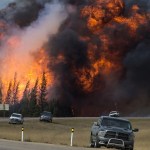Fort McMurray Fire
Four weeks after a wildfire began in the Canadian province of Alberta, thousands of structures in Fort McMurray have been destroyed, over 100,000 people have been evacuated, and 2200 square miles have gone up in smoke. The fire has also shut down commercial extraction of tar sands, a source of fossil fuel and the reason for Fort McMurray's prosperity. Greg Laden points out the perverse cause and effect of it all: tar sands contribute to global warming, global warming contributes to weather variation and drought, drought makes regions extra-vulnerable to wildfire, and wildfire shuts down tar…
Remember that big wild fire that threatened, and damaged, Fort MacMurray, causing major evacuation in the oil sands mining region of Canada?
Well, the fire never went out and has now changed directions to threaten settlements again.
__________
Update (mid day Tuesday): The fire is now actually burning some homes/buildings in Ft. McMurray. One of them may have actually exploded. Maybe two.
On the other hand, the oil sands camps to the north seem to be less threatened, or not threatened. The area around these sites are clear of major vegetation, and there are "industrial firefighters" on the…
This is a segment of The Big Picture with Thom Hartmann, in which climate scientist Professor Michael Mann provides important perspective on the link between climate change and other disasters such as tornadoes. (See also: The Meaning of the Fort McMurray Fire).
Michael Mann is the author of The Hockey Stick and the Climate Wars: Dispatches from the Front Lines, and Dire Predictions, 2nd Edition: Understanding Climate Change (a visually rich summary of the most recent IPCC report) as well as the forthcoming book combining climate science and political cartooning, The Madhouse Effect: How…


